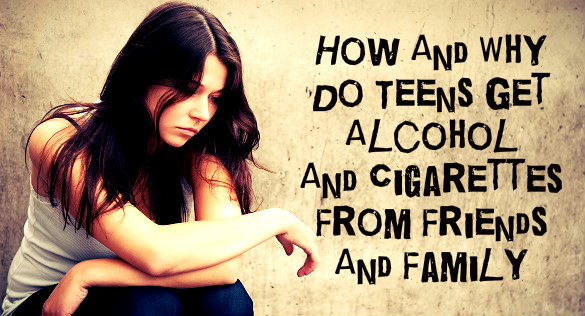Study Shows Teens Get Cigarettes And Alcohol From Friends And Family
Teens that begin using alcohol and other substances during adolescence are engaging in what experts call early initiation, which is a concern because individuals that begin using substances recreationally in high school may go on to develop a dependence by the time they reach adulthood.
There are deterrents in place to prevent teens from using alcohol and cigarettes; including age limits and heavy consequences if a business is caught selling to minors or an individual is caught purchasing for them.
A new study conducted by the Centre for Addiction and Mental Health (CAMH) finds that the majority of teens in Ontario, Canada, obtain these products from friends or family.
The researchers surveyed teens in grades 7 to 12. Among the students that smoked cigarettes, 58 percent report obtaining their last cigarette from a friend or family member. 19 percent of teen smokers said that they bought the cigarettes from a corner store, bar, gas station or grocery store.

Gender, Age And Neighborhood Differences In Obtaining Cigarettes, Alcohol
Males were more likely to report that they had obtained cigarettes from a store compared with females. Seventy-three percent of the females involved in the survey said that their last cigarette came from a friend or family member.
When students were asked about consuming alcohol, 39 percent of those that drank said that their last drink was given to them, while 28 percent asked someone else to purchase the alcohol for them. Four percent of students said that they purchased the alcohol themselves from a liquor store.
The students from an urban area were more likely than those in rural settings to indicate that someone had provided them with alcohol (40 vs. 35 percent). Among those in rural areas, 33 percent of the students said that they gave someone else money to purchase alcohol for them, while 27 percent of students in urban settings asked someone to buy alcohol for them.
The report also found that there were trends according to the student’s age. Older teens were more likely than their younger counterparts to admit that they obtained alcohol by paying someone to purchase it for them. This occurred at a rate of 32 percent for older teens versus two percent for younger teens. Younger teens were more likely to indicate that someone gave them alcohol at a rate of 53 percent versus 37 percent for older teens.
Parents And Corner Stores Involvement And Responsibility
Principal investigator for the study, Dr. Robert Mann, is also the Senior Scientist at CAMH. Mann explained that teens are often obtaining alcohol and cigarettes from the very people that should be protecting them from exposure to such substances.
The findings also indicated that teens were able to easily access cigarettes from corner stores that don’t sell alcohol. The findings suggest that the availability of alcohol at corner stores could result in increasing rates of teens purchasing alcohol.
The information for the study was derived from the Ontario Student Drug Use and Health Survey by CAMH. The survey was administered to 9,288 students in the 7 through 12 grades at 40 public and Catholic schools in Ontario. The survey has been given to students every two years since 1977.
Parents concerned about their children obtaining alcohol and cigarettes during adolescence can openly discuss these matters with their teens. Studies have shown that by introducing the topic multiple times into conversation teens are much more able to make informed decisions.
Another way to prevent teens from using substances is to talk with other family members about the teens’ substance use. In some cases, the teen is obtaining cigarettes or alcohol from an older sibling.



